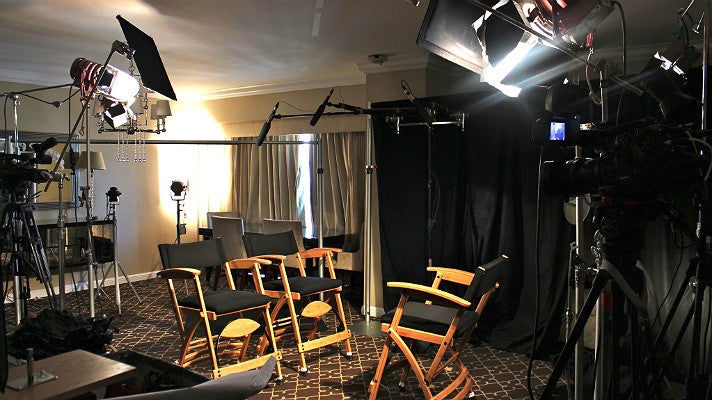The celebrity interview is dead, and you're the one who killed it
With social media outrage looming in the background, very little is left on the table besides the fancy bottles of water

The other day I had a quick phone interview with Drive director Nicolas Winding Refn. He’d just wrapped on his next film, a horror called The Neon Demon, and given there is already a plot synopsis, poster and stills out there for it, it seemed fair enough to ask him a little about how the project’s going.
Me: I know you’ve said that the film is about a model heading to LA and being devoured by women who are after her youth and looks - could you elaborate a little bit about the story and its tone?
NWR: I haven’t finished the movie yet so I can’t talk about it.
Fair enough, I thought, I guess tone is often established in editing during post-production. I wondered if I could get a general sense of the genre.
Me: OK, but is it definitely going down the horror route or is it more of a satire on LA?
NWR: I don’t know, I haven’t finished it.
Surely the score is up for discussion at least.
Me: Cliff Martinez is back to do the score. Can you tell me anything about that, because in Only God Forgives and Drive the way you used sound was quite different?
NWR: I haven’t finished the movie yet so I don’t know.
Wow, he really doesn’t want to talk specifics. Maybe he can at least help me fit the movie into a wider context?
Me: The film has an almost entirely female cast. Even though obviously the project started a long time before, the theme of the importance placed on beauty is really poignant at the moment given the big discussion about ageism regarding women in Hollywood. Is that something you’ve been conscious of at all while making the film?
NWR: I don’t know, I haven’t done the movie yet.
I don’t hugely blame Nicolas for his reluctance to talk even casually about the movie, which was partly down to him not expecting that line of questioning, and partly down to the danger of revealing any information whatsoever to the media these days. I’m not talking about the personal life stuff, which is the lifeblood of E!, TMZ etc and understandably something no actor, director, musician, writer should ever have to talk about if they don’t want to, but details regarding people’s creative work and professional relationships that are of legitimate interest to fans and cinephiles.
In particular, there are three topics that render stars dumb in icily air-conditioned junket hotel rooms recently, and their effect on talent seems to be symptomatic of online journalism and social media:
Spoilers
It used to be the case that it was only huge, climactic moments that were off limits, and that makes total sense; who wants to know how their favourite show is going to end anyway? But this has grown in the last couple of years to encompass just about any narrative element yet to be broadcast/screened.
Of course, a good interviewer should be interested in more than ‘what’s going to happen next’, but sometimes the future needs to be discussed to talk about wider issues in projects, and yet any mention of upcoming scenes yields “I’m not allowed to say” non-responses and furious decapitation gestures from hovering agents, lest a tiny nugget of info find its way on to Reddit.
Opinions on anything more controversial than their taste in condiments
Make any comment about political or social issues as a celebrity now, and you can expect to be quoted entirely out of context in a pithy headline and accused of about 15 different kinds of prejudice on Twitter within minutes.
Commenting on other celebrities
God help you if you say that working with X Factor was anything else than the most ecstatic moment of your career, or that a peer’s comments were misjudged, as Game of Thrones actor Richard Madden found out to his horror this week when making a passing comment about Cara Delevingne during an interview for a fashion magazine.
Once upon a time, actors would admit "this movie wasn’t my best work" or "that director was hard to work with", and you’d learn a little about the film-making process (although if that’s what you’re after, then it’s directors, cinematographers, producers and the like that need to be doing the press rounds rather than actors, who usually have little creative input - but that’s a matter for film publicists to address another day.) And it’s sad that most interviews have become trodden with stale and stilted accounts of “just fantastic experiences” and regurgitated, PR-approved answers.
So who is to blame, if I’m to be more specific than just saying “the internet!” like a crotchety old man?
Everyone, really. The media need to give more credence to context; readers need to question whether they really and truly believe an individual is actually prejudiced against a gender before they scream “sexist” from a social media account; celebrities need to have more courage in their convictions and opinions, rather than defaulting to "heartfelt apology" every time they are criticised; journalists need to be more persistent with their questioning; and networks and studios need to recognise that a film or a TV season doesn’t need to be regarded with the same level of secrecy as the Enigma code.
In the meantime, I’m off to hear about how great the atmosphere was on the set of your next favourite show and - of course - how everyone was super nice to work with.

Join our commenting forum
Join thought-provoking conversations, follow other Independent readers and see their replies